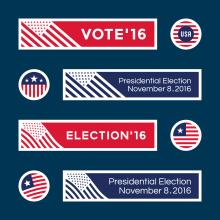Indiana
Vice President Mike Pence — a onetime altar boy who became an evangelical Protestant — proclaimed President Donald Trump a faithful supporter of Catholic values at the National Catholic Prayer Breakfast, an event that sought to set aside any friction between the president and the pope.
“Let me promise all of you, this administration hears you. This president stands with you,” Pence said to the 1,300 gathered.
“Now think about it, especially right now, with apparent one-party rule in our government: Congress and the president could pass comprehensive immigration reform tomorrow if they wanted to,” Cardinal Joseph Tobin of Newark told an audience of journalists meeting in Brooklyn on May 17. “They could bring nearly 12 million people out of the shadows — if they wanted to."
President Trump’s proposed border wall with Mexico raises serious questions about America’s moral standing, as the poor would bear the brunt of the suffering, a leading Catholic theologian says.
The Rev. Daniel G. Groody, an associate professor of theology at Notre Dame University in Indiana, said the wall would lead to a loss of life, as migrants are forced to find other ways to escape poverty across the border.
“What Trump fails to see is that state sovereignty is not an absolute privilege, but a moral responsibility,” said Groody.

Image via pne/Shutterstock.com
You should call the Lawyers’ Committee for Civil Rights Under Law hotline 866-OUR-VOTE (866-687-8683) if you, or someone you know, are notified that you can’t vote, or can vote only under certain circumstances, and you suspect that unlawful practices are to blame for the difficulty.
Likewise, you should call the hotline if you notice at the poll any of the following eight possible signs of voter suppression, or if you notice blatant voter intimidation.

Image via Gino Santa Maria / Shutterstock.com
An Indiana evangelical leader says he and other Christians are in an “untenable situation” after Senator Ted Cruz’s withdrawal from the 2016 presidential race.
Speaking on NPR’s Morning Edition program, Ron Johnson Jr., head of the Indiana Pastors Alliance, could not explain why 50 percent of Indiana’s evangelicals voted for Donald Trump, according to exit polls.

Indiana State Capitol. Image via Jimmy Emerson, DVM / flickr.com
In the legislation, the state’s schools and businesses would be allowed to write their own policies on the use of bathrooms or showers based on sex, sexual orientation, or gender identity. They also could decide for themselves what dress code to impose on students and workers.
Under the bill, those rules wouldn’t count as discriminatory.
House and Senate Democrats have called for simpler solution, saying a fix could be had by adding four words and a comma: “sexual orientation, gender identity” to the Indiana’s civil rights law.

Image via OlegDoroshin / Shutterstock
Just before the Religious Freedom Restoration Act controversy exploded in Indiana earlier this year, a compromise was playing out 1,500 miles away.
In Utah, as the Salt Lake Tribune noted, same-sex marriage had been banned both through state law and constitutional amendment. Attempts to pass lesbian, gay, bisexual, and transgender anti-discrimination measures had failed six times.
But in March, lawmakers brought together representatives from the Mormon and LGBT communities and passed landmark legislation.
Utah law now lists sexual orientation and gender identity as protected classes in housing and employment — but, without buy-in from the religious community, it does not include “public accommodations,” a broad legal term used to describe everything from bus services to restaurants and other private businesses.
The Supreme Court will hear arguments next week in a landmark case on gay marriage, but most Americans already have made up their minds: There’s no turning back.
In a nationwide USA Today/Suffolk University poll, those surveyed say by 51 percent to 35 percent that it’s no longer practical for the Supreme Court to ban same-sex marriages because so many states have legalized them.
One reason for a transformation in public views on the issue: close to half say they have a gay or lesbian family member or close friend who is married to someone of the same sex.
Kraig Ziegler, 58, of Flagstaff, Ariz., acknowledged being a bit uncomfortable when he attended a wedding reception for two men, friends of his wife, who had married.
“I still believe what the Bible says, ‘one man, one woman,’ ” the mechanic, who was among those polled, said in a follow-up interview.
On the other hand, he said, “I got to know the guys, and they’re all right. They don’t make passes or anything at me.”
Now he calls himself undecided on the issue.
In the survey, a majority — 51 percent 35 percent — favor allowing gay men and lesbians to marry, and those who support the idea feel more strongly about it than those who oppose it: 28 percent “strongly favor” same-sex marriage, 18 percent “strongly oppose” it. Fourteen percent are undecided.
While reflecting upon and celebrating Easter, I did quite a bit of thinking about the controversies surrounding so-called “religious freedom” bills that have been popping up recently, most notably Indiana and Arkansas. In a recent interview on the Family Research Council radio program, “ Washington Watch with Tony Perkins," former Arkansas Governor Mike Huckabee discussed the backlash against these two pieces of legislation.
Huckabee asserted that gay-rights activists are seeking the eradication of Christian churches. According to Huckabee, “It won’t stop until there are no more churches, until there are no more people who are spreading the Gospel.”
Christianity has been and continues to be the dominant form of religious practice and expression in America. Often the rhetoric used by members of dominant groups insinuates that when people outside of their dominant group ask for equal rights and the opportunity to participate fully in American life, they are actually seeking to eradicate the existence of that dominant group.
Little by little, the direct sun of spring is vanquishing the snow of this long winter, and new life is starting to emerge.
Something similar is happening in my home state of Indiana, where the darkness met behind closed doors to conspire against certain citizens in the name of religion.
For a time, hatred prevailed. But then a more-direct sun began to shine in the American heartland, and people took notice of what the Republican-controlled Legislature and cowardly governor had done.
The people spoke out. It started with leaders in the tech community (Salesforce, Apple, Angie’s List) and, to my amazement, pillars of the sports establishment, such as the NCAA and NASCAR. Soon, citizens across Indiana and the nation condemned the state’s so-called Religious Freedom Restoration Act as little more than legalized discrimination.
A host of governors, CEOs, and church leaders call Indiana’s new religious freedom law a backdoor opening to anti-gay discrimination, but Americans appear more divided on whether a wedding-related business should have the right to turn away a gay customer.
The law, which critics say would allow owners of small businesses to invoke their faith to refuse service to LGBT customers, applies most apparently to wedding vendors — bakers, photographers, and florists, for example — who cite their faith in opposing same-sex marriage.
Where is the American public on this debate? It depends on how the question is asked.
A February Associated Press poll found that 57 percent of Americans believe a wedding-related business should have the right to refuse service to a gay couple on religious grounds, as opposed to nearly 4 in 10 Americans (39 percent) who said that religious exemption — which Indiana’s new law explicitly allows — is wrong.
1. At Least 10 Religious Groups Have Come Out Against Anti-LGBT 'Religious Liberty' Laws
"While substantial attention has been paid to the lawmakers, athletes, businesses, and celebrities who have challenged the new laws, less has been said about the steady flow of criticism from the exact group these RFRAs are ostensibly designed to protect: people of faith."
2. Stress and Hope in Tehran
On Thursday, the U.S. and Iran along with five world powers reached a preliminary deal that would curb Iran’s nuclear program and address sanctions imposed upon the country. The New York Times offers this glimpse into what those sanctions mean for ordinary Iranians.
3. Outcry Over RFRA Might Be a Fear of Christians
"The outcry isn’t about the law, it’s about us. It’s a fear that we will discriminate. And it is a fear based on a history that, whether we like it or not, is ours. We have, in no shortage of ways, broken relationships with the LGBTQ community. We have expelled our sons and daughters. We have protested them. We blamed them for the ills of society like a scapegoat. And no matter what we believe about same-sex marriage, that is wrong. Because of that, restoring relationship and trust with the LGBTQ community is on us."
4. Why I Won't Wear White on My Wedding Day
"As far as we have come, and as removed from these traditions’ origins as we may be, we are still attached to these remnants of a woman’s worth and identity being grounded in her sexual activity, importantly solely for the purposes of her pleasing a man."
Indiana Republican legislative leaders, under growing pressure from inside and outside the state, said April 2 that lawmakers had reached agreement to amend Indiana’s controversial “religious freedom” law to ensure it does not discriminate against gay and lesbian customers of Indiana businesses.
The proposal, rolled out at the Statehouse, would grant new protections for LGBT customers, employees and tenants.
“What was intended as a message of inclusion was interpreted as a message of exclusion, especially for the LGBT community,” Indiana House Speaker Brian Bosma told reporters at the Statehouse.
“Nothing could have been further from the truth, but it was clear the perception had to be addressed.”
“Hoosiers value gays, straights, blacks, whites, religious and nonreligious,” Bosma said.
“We value each and every Hoosier.”
Editor's Note: Since original publication of this piece, Indiana lawmakers have announced changes to the Indiana RFRA legislation that includes anti-discrimination language.
Last week Indiana found itself at the center of the news cycle for all the wrong reasons. With Gov. Pence’s signing of the state's Religious Freedom Restoration Act, our nation once again found itself taking sides in the debate over LGBTQ rights.
Honestly, I’m torn over this issue. I understand that the Indiana bill was fashioned after the 1993 bill that was signed into federal law by Bill Clinton. I know that 19 other states have RFRA legislation. And, as a pastor, I support religious freedom, not just for Christians, but for Buddhists, Muslims, Jews, and yes, even Westboro Baptists. I think most Americans support protecting individuals' rights to conscientiously practice their faith. Freedom of religion is one of the things that makes this country great, and that freedom is worth protecting. But this bill, supposedly enacted to protect those freedoms, has caused quite the stir. Even more interesting to me are the people I follow on social media who are much more interested and knowledgeable than me in politics who say Indiana’s RFRA won’t amount to significant change. This raises the very simple question, “Then why pass the bill?”
Though the Christian Church (Disciples of Christ) has made Indianapolis its headquarters for nearly a century, the denomination is considering pulling its next biennial convention out of Indiana over a new state law that allows businesses to turn away gay customers.
Gov. Mike Pence signed the Religious Freedom Restoration Act on March 26, the day after receiving a letter from church leaders pleading with him to veto it and threatening to move their 2017 General Assembly outside the state.
The bill protects business owners who invoke their religious beliefs to deny service to LGBT customers. A photographer, for example, may refuse to take pictures of a lesbian wedding on the grounds that his faith rejects gay marriage.
“Purportedly a matter of religious freedom, we find RFRA contrary to the values of our faith — as well as to our national and Hoosier values,” stated the letter, which was signed by Sharon E. Watkins, the church’s general minister and president, as well as the leaders of its overseas and domestic missions.
“As a Christian church, we are particularly sensitive to the values of the One we follow — one who sat at table with people from all walks of life, and loved them all.”
The General Assembly will bring more than 6,000 church members to whatever U.S. city the church decides upon and is expected to generate about $5 million in tourism dollars. After Pence signed the law, ministry leaders said they are weighing the costs of moving not only the General Assembly, but smaller meetings — such as the more frequent gatherings of the 125-member board of directors — which most often meets in Indianapolis.
Associate General Minister and Vice President Todd Adams said the church’s board will decide whether to yank the General Assembly from Indianapolis at its next meeting, which begins on April 10.
Other businesses and conventions, including Gen Con, the world’s largest gaming convention, which brings an estimated $50 million to the state each year, have also threatened to find another place to hold their events.
A federal court in Indiana has rejected atheists' requests to preside at wedding ceremonies, saying only clergy or public officials are licensed to solemnize marriages.
A lawsuit filed by the Indiana chapter of the Center for Inquiry argued that an Indiana law that requires marriages to be “solemnized” — made official by signing a marriage license — only by clergy, judges, mayors or local government clerks violates the Constitution.
But Judge Sarah Evans Barker of the U.S. District Court for the Southern District of Indiana ruled on Nov. 30 that marriage has religious roots. Therefore, government regulation of marriage is an act of religious accommodation — not endorsement — and protected by the Constitution.
Sen. Richard Lugar (R-IN) was defeated for renomination yesterday in the Indiana Republican primary. During 35 years in the Senate, Lugar had built a reputation as a conservative, but one who was willing to work across the aisle, especially on issues of foreign policy and nuclear non-proliferation. That willingness became a major attack point for his opponent, State Treasurer Richard Mourdock, who pledged to end attempts at bipartisanship by pushing a more conservative agenda. “I have a mindset that says bipartisanship ought to consist of Democrats coming to the Republican point of view,” he said this morning.
Lugar’s concession statement was unyielding:
"If Mr. Mourdock is elected, I want him to be a good Senator. But that will require him to revise his stated goal of bringing more partisanship to Washington. He and I share many positions, but his embrace of an unrelenting partisan mindset is irreconcilable with my philosophy of governance and my experience of what brings results for Hoosiers in the Senate. In effect, what he has promised in this campaign is reflexive votes for a rejectionist orthodoxy and rigid opposition to the actions and proposals of the other party. His answer to the inevitable roadblocks he will encounter in Congress is merely to campaign for more Republicans who embrace the same partisan outlook."
Here are a few of today’s reactions.













